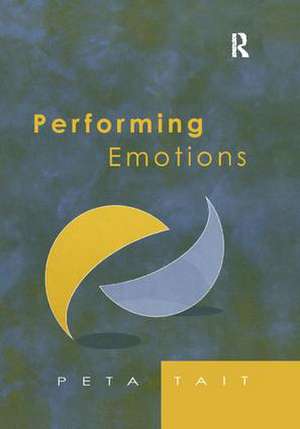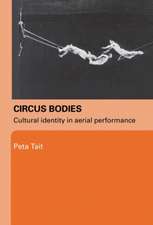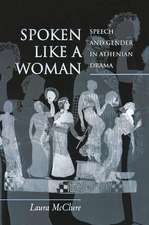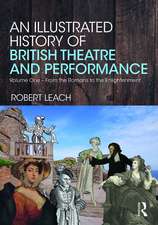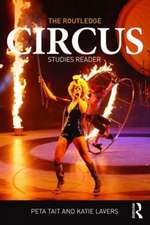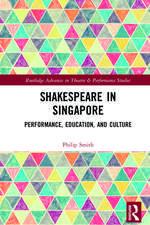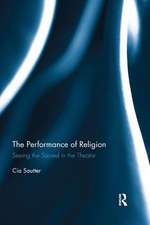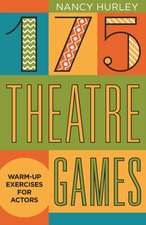Performing Emotions: Gender, Bodies, Spaces, in Chekhov's Drama and Stanislavski's Theatre
Autor Peta Taiten Limba Engleză Paperback – 30 apr 2017
Preț: 298.10 lei
Preț vechi: 340.83 lei
-13% Nou
Puncte Express: 447
Preț estimativ în valută:
57.04€ • 59.72$ • 47.20£
57.04€ • 59.72$ • 47.20£
Carte tipărită la comandă
Livrare economică 07-21 aprilie
Preluare comenzi: 021 569.72.76
Specificații
ISBN-13: 9781138263598
ISBN-10: 1138263591
Pagini: 210
Dimensiuni: 153 x 219 x 16 mm
Greutate: 0.39 kg
Ediția:1
Editura: Taylor & Francis
Colecția Routledge
Locul publicării:Oxford, United Kingdom
ISBN-10: 1138263591
Pagini: 210
Dimensiuni: 153 x 219 x 16 mm
Greutate: 0.39 kg
Ediția:1
Editura: Taylor & Francis
Colecția Routledge
Locul publicării:Oxford, United Kingdom
Cuprins
Contents: Introducing Emotions: The politics of emotions in theatre; Discursive approaches; Defining emotions: Hope and Despair: Theatrical Emotions, Hysteria and Masculinity: Self-dramatisation and Chekhov's characters;The Seagull (1896); Reverberating fictions and love; The characterisation of hysteria; Uncle Vanya (1897); A crisis of masculine identity; A gendered economy of emotion; The social meaning of theatrical emotions ; Loss, Nostalgia and Yearning: Representations of a Feminine Self: Literary love; Three Sisters (1901); Representations of feminine emotions; Emotional spaces; The Cherry Orchard (1903); Emotional geographies; Embodied emotions and performative acts; Femininity as excess emotion; Happy to Sad: Stanislavski's Theatrical Logic Embodied: Acting emotions; Acting being, belief and truth; Controversy over the director's realist logic; Social bodies act inner emotions?; Training repetitions of bodies; Laughter and Tears: Interiority as Bodily Control Over Emotions: Olga Knipper, Stanislavski and acting naturally; Theoretical mastery over interiority; A modern theatre of private love; Staging natural and deep; Performing Emotional Bodies: Phenomenological bodies per/form; Brecht's separation of emotion; The social performance of emotion; Display rules and performative identities; Emotions and corporeal subjectivity; Transgressive emotional performances; Conclusion; Bibliography; Index.
Recenzii
'No other study looks so extensively at the embodiment of gendered emotion positioned between Chekhov as playwright and Stanislavsky as director. In the process, Tait pays new respect to Knipper's artistic work. Moreover, feminists tend to reject the Stanislavsky System in favor of Brecht's theatrical approach, and Peta Tait challenges this overly simplified view in her unique study about the performance of gendered emotion. While post-modernist scholarship often uses theatrical metaphors to describe "the performative", Tait infuses her valuable analysis with the complexities of actual theatrical performance. In the process, she raises essential questions about the differential performance of emotion by women and men.' Sharon Marie Carnicke, Professor of Theatre & Slavic Studies and Associate Dean of Theatre, University of Southern California '... this study provides a unique angle from which to view the plays of one of the most significant modern dramatists and his first two important interperters.' Journal of Comparative Drama
Descriere
In Performing Emotions, Peta Tait's central argument is that performing emotions in realism is also performing gender identity. This study integrates scholarship on realist drama, theatre and approaches to acting, with interdisciplinary theories of emotion, phenomenology and gender theory. With chapters devoted to masculinity and femininity specifically, as well as to emotions generally, it investigates social beliefs about emotions through Chekhov's four major plays in translation, and English language commentaries on Constantin Stanislavski's direction (of the play's first productions) and his approaches to acting, and Olga Knipper's acting of the central women characters. Tait demonstrates how theatrical emotions are predicated on embodied social performances and create cultural spaces of emotions. Performing Emotions investigates how sexual difference impacts on the representations of emotions. The book develops an accumulative analysis of the meanings of emotions in twentieth century realist drama, theatre and acting.
